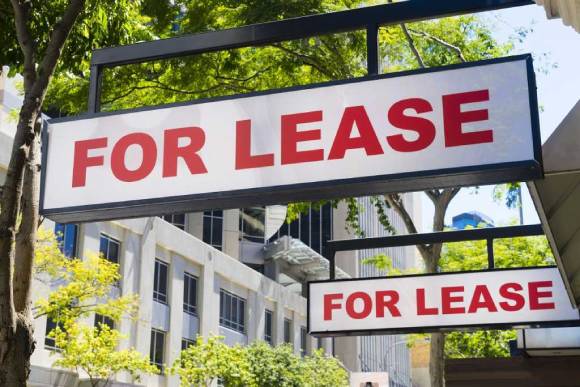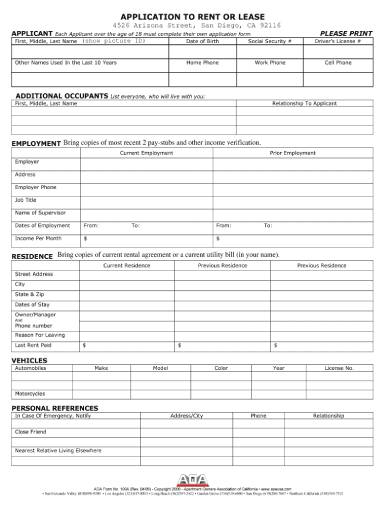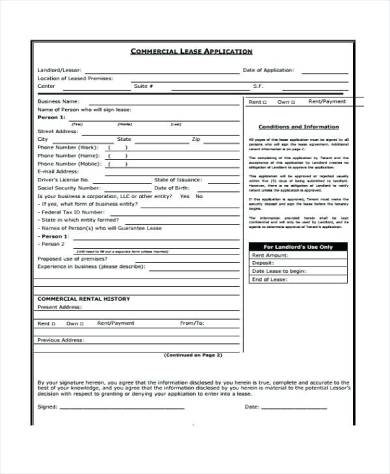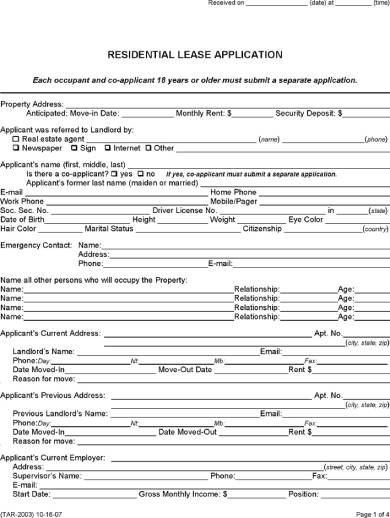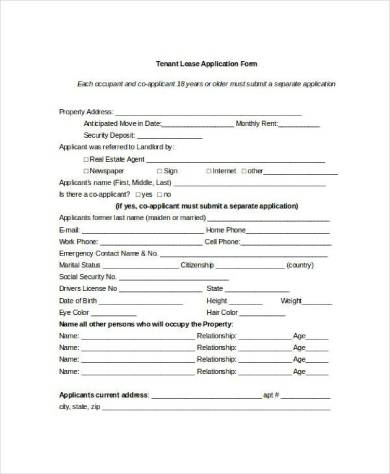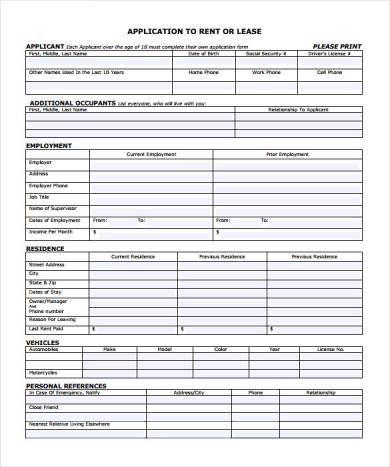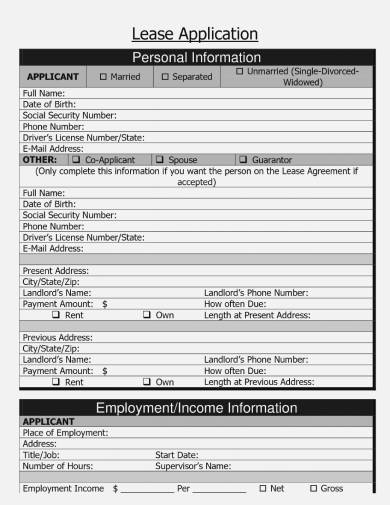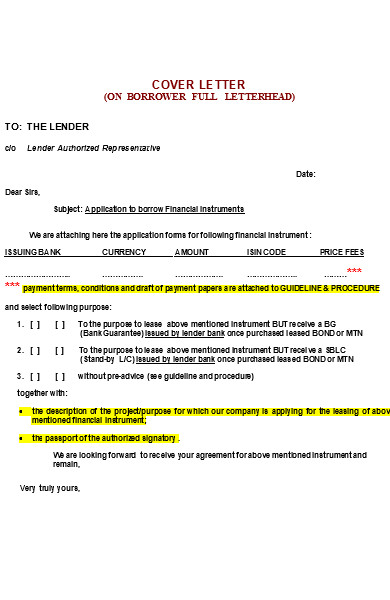A Lease is defined as a contract between the Landlord and the Tenant wherein the Tenant conveys the intention to rent the Landlord’s property for a definite period. Leasing applies not only to real properties such as a parcel of land or a room in a building. Leasing also applies to movable properties, such as cars and equipment. Applying for a lease relieves you from the burden and hassle of filing tax forms and maintenance expenses that come with owning a house or equipment.
What is a Leasing Application Form
A Leasing Application Form is an application form specifically used for leasing property and equipment. This form contains the Applicant’s personal information, employment details, and the number of tenants that will be occupying the property. In the case of leasing vehicles and equipment, these forms will ask for company details, banking details, and transaction details. Other details about the lease, such as the period of the lease, terms, and conditions, will be specified in a separate document called a leasing agreement.
5+ Sample Leasing Application Forms
Application to Lease Form
Commercial Leasing Application Form
Residential Leasing Application Form
Tenant Leasing Application Form
Application for Leasing Form
Tenancy Leasing Application Form
Bank Leasing Application Form
Types of Leases
For most, leasing may only refer to the long term, temporary use of a building or a house. Although the term leasing is commonly identified with the real estate industry, other properties are also subject to leasing. Listed below are the types of leases.
1. Commercial Lease
A Commercial Lease is a type of lease contract that specifically deals with the temporary use of the property for business purposes. As with other types of leases or leases in general, commercial leases outlines terms and conditions agreed by the tenant and the landlord with regards to the use of the property. This document starts with a commercial lease application and commercial lease agreement.
2. Residential Lease
Residential lease pertains to an agreement between a landlord and tenant about the use of the property for residential purposes. The terms and conditions of this lease would delve into concerns, most particularly in the ownership of pets. If you’re planning to enter the residential leasing business, then a residential lease application form and a residential lease agreement would be in order.
3. Equipment Lease
An Equipment Lease Agreement is a type of lease where individuals or businesses would discuss the terms and conditions for the temporary use of equipment. Pieces of equipment subject to lease are not limited to machinery but may also include vehicles such as heavy equipment. Heavy equipment leasing are popular among construction firms and independent contractors.
4. Vehicle Lease
A Vehicle Lease is a lease agreement between an individual and a business where a vehicle would be loaned for temporary use. Vehicles subject to the lease would range from motorcycles, cars, vans to trucks depending on the purpose of the vehicle, as specified in the lease contract. If you’re looking to temporarily use a delivery van for a long period, entering a vehicle lease agreement would be ideal for you.
How to Make a Leasing Application Form
Leasing is popular among today’s generation. Millennials, People born between the early ’80s and grew up at the beginning of the 21st century, would rather lease and rent than own a car or a house. In a report, the majority of Millennials would rather rent an apartment while 37 percent of them chose to own a house. With the rise of popularity of leasing and renting among today’s generation, no wonder why Leasing Application Forms are more useful these days. Here are the steps on how to make your own Leasing Application Forms for your leasing business needs.
Step 1. Download a Leasing Application Form Template
The first step in making your own leasing application form is to download a template for this particular document. Downloading a leasing application form template lets you save time from the hassle of making one from scratch. You can download this document from the list of samples provided in this article.
Step 2. Add a Letterhead to the Form
The next thing to do after downloading is to add a letterhead to your leasing application form. Your letterhead should include your business name and logo (if applicable). Adding a letterhead to your leasing application form will provide a unique and distinct identity to the document.
Step 3. Provide Spaces for Information to be Written On
After adding a letterhead to the form, the next step to the process of making this form is to put spaces to write information on it. Provide spaces to write information such as personal details about the tenant and its companions, employment and income information, and personal references. Aside from having spaces for information to be written on, don’t forget to reserve a space for you and the tenant to sign on. Lastly, make sure that the spaces you provide are big enough to accommodate the length of information that will be written on it.
Step 4. Print your Leasing Application Form
After accomplishing the previous steps, the next thing to do is to print your leasing application form. You can have your finished leasing application form printed using home, office, and commercial printers. Printing your document allows you to keep multiple copies of it in your file cabinet for future use.
Step 5. Draft a Lease Agreement
Aside from making a Leasing Application Form, consider drafting a Lease Agreement to complete the contract of lease. A lease agreement details the terms and conditions of the lease of the property, and it makes the lease contract legally binding. Once the contract is legally binding, it obliges both contracting parties to respect the stipulations specified by the agreement itself. There is absolutely no alternative for a legally binding contract.
Related Posts
-
Job Application Form
-
Internship Application Form
-
Recruitment Application Form
-
FREE 6+ Background Check Application Forms in PDF | MS Word
-
FREE 10+ New Job Application Forms in PDF | MS Word | Excel
-
FREE 10+ Commercial Rental Application Sample Forms in PDF | MS Word
-
FREE 5+ HR Reclassification Application Forms in PDF | MS Word
-
FREE 8+ Clearance Application Forms in PDF | MS Word
-
FREE 6+ Talent Application Forms in PDF | MS Word
-
FREE 6+ House Rental Application Forms in PDF | MS Word | Excel
-
FREE 10+ Sponsor Application Forms in PDF | MS Word | Excel
-
Security Guard Application Form
-
FREE 9+ Articles Of Organization Forms in PDF
-
FREE 4+ Retail Job Application Forms in PDF | MS Word
-
FREE Department Store Job Application Forms in PDF | MS Word
